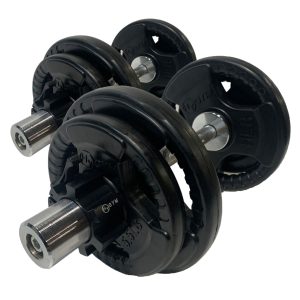Have you ever wondered if weight training can make you bulky? Well, the truth might surprise you. Many people avoid weight training because they fear it will make them look too big or muscly. However, contrary to popular belief, weight training does not automatically lead to a bulky physique. In fact, incorporating weights into your fitness routine can have numerous benefits for both men and women, helping to improve strength, increase bone mineral density, boost metabolism, and enhance overall body composition. So, let’s debunk the myth and discover why weight training might be just the thing you need to achieve your fitness goals.
Table of Contents
ToggleMyths about weight training and bulking up
Misconceptions about weight training and bulking
When it comes to weight training and bulking up, there are countless myths and misconceptions that can cause confusion and fear. One common misconception is that weight training will automatically make you bulky and give you a bodybuilder-like physique. This is simply not true. Bulking up requires a specific training program, diet, and often the use of supplements or performance-enhancing substances.
Common fears and concerns
Many people fear that weight training will make them look “too muscular” or “masculine.” However, it’s important to understand that women produce significantly less testosterone than men, which means they have a much lower potential for muscle growth. Weight training alone will not cause women to become excessively muscular. Instead, it can help them achieve a lean and toned physique, improve bone density, and increase overall strength.
Understanding muscle growth
How muscles grow
To understand the role of weight training in muscle growth, it’s important to know how muscles actually grow. When you engage in weight training, you create microscopic tears in your muscle fibers. These tears stimulate your body to repair and rebuild those muscles, resulting in muscle growth. This process is known as muscle hypertrophy.
Factors influencing muscle growth
Muscle growth is influenced by various factors, including genetics, hormones, nutrition, and training intensity. While genetics play a significant role in determining our natural muscle-building potential, proper training and nutrition can maximize our muscle growth. Hormones, such as testosterone, also play a role in muscle development. However, it’s important to note that weight training alone does not lead to excessive increases in testosterone levels.
The role of weight training in muscle development
Benefits of weight training for muscle development
Weight training offers numerous benefits for muscle development. It not only helps increase muscle size, but also improves muscle strength, endurance, and power. Additionally, weight training can enhance overall body composition by reducing body fat and increasing lean muscle mass. This can lead to a more defined and athletic physique.
Types of weight training exercises
There are various types of weight training exercises that target different muscle groups and serve different purposes. Resistance training, which includes exercises like weightlifting, bodyweight exercises, and resistance band workouts, is the most effective form of weight training for muscle development. This type of training challenges your muscles to overcome resistance, leading to muscle growth and increased strength.
Hormonal impact of weight training
Effect of weight training on testosterone levels
Contrary to popular belief, weight training does not significantly increase testosterone levels in most individuals. While weight training can temporarily elevate testosterone levels during and immediately after a workout, these levels return to normal shortly after. This increase is a natural response to the physical stress of the workout, but it does not lead to excessive muscle growth or the development of masculine features.
Role of testosterone in muscle growth
Testosterone plays a crucial role in muscle growth and development, but its impact varies depending on factors such as age, gender, and genetics. Men naturally have higher levels of testosterone compared to women, which contributes to their greater potential for muscle growth. Women, on the other hand, have much lower levels of testosterone, making it unlikely for them to develop bulky muscles through weight training alone.
Women and weight training
Myths about women and weight training
There are several myths surrounding women and weight training that can discourage them from engaging in this beneficial form of exercise. One common myth is that weight training will make women bulky and unfeminine. As mentioned earlier, women have lower testosterone levels, which limits their ability to gain significant muscle mass. Instead, weight training can help women improve their strength, fitness, and overall body composition.
Benefits of weight training for women
Weight training offers numerous benefits for women’s health and fitness. It not only helps build lean muscle mass and strength but also improves bone density, reduces the risk of osteoporosis, and enhances overall body composition. Additionally, weight training can boost metabolism, leading to increased calorie burn and improved weight management. It also contributes to better functional fitness, making everyday tasks easier and reducing the risk of injury.
Importance of nutrition in muscle development
Protein and muscle growth
Proper nutrition is essential for muscle development and growth. Protein, in particular, plays a crucial role as it provides the building blocks necessary for muscle repair and synthesis. When engaging in weight training, it’s important to consume an adequate amount of protein to support muscle growth and repair. Good sources of protein include lean meats, poultry, fish, dairy products, legumes, and tofu.
Other important nutrients for muscle development
While protein is important, other nutrients also play a role in muscle development. Carbohydrates provide energy for your workouts, while healthy fats support hormone production, which is necessary for optimal muscle growth. Additionally, vitamins and minerals, such as vitamin D, calcium, and magnesium, are essential for muscle function and recovery. It’s important to maintain a well-rounded and balanced diet to ensure all nutrient needs are met.
Body composition and weight training
Body fat vs. muscle mass
Weight training not only helps build muscle mass but also contributes to improving body composition by reducing body fat. When you engage in regular weight training exercises, your body becomes more efficient at burning calories, even at rest. This increased calorie burn, combined with the muscle-building effects of weight training, leads to a decrease in body fat percentage and an increase in lean muscle mass.
How weight training affects body composition
Weight training triggers the development of lean muscle mass, which plays a crucial role in improving body composition. Muscles are metabolically active tissues that require more energy to maintain compared to fat. As a result, the more lean muscle mass you have, the higher your resting metabolic rate becomes. This means that even when you’re not actively exercising, your body will burn more calories throughout the day, making it easier to maintain a healthy weight.
Genetics and body type
Genetic factors that impact muscle development
Genetics plays a significant role in determining our muscle-building potential. Some individuals naturally have a greater ability to build muscle mass, while others may struggle to see significant gains despite rigorous training. Factors such as muscle fiber type, muscle length, and muscle attachment points are all genetically determined and can affect how your muscles respond to weight training.
Different body types and their response to weight training
There are three main body types: ectomorphs, mesomorphs, and endomorphs. Ectomorphs tend to be naturally thin and may have difficulty building muscle mass. Mesomorphs have a more muscular build and tend to respond well to weight training, easily gaining both muscle and strength. Endomorphs have a higher tendency to store body fat and may require a different approach to weight training and nutrition to achieve their desired body composition.
Progressive overload and muscle growth
What is progressive overload
Progressive overload is a fundamental principle of weight training that is essential for muscle growth. It involves gradually increasing the demands placed on your muscles to continually challenge them and stimulate growth. This can be achieved by progressively increasing the weight lifted, the number of repetitions performed, or the intensity of the exercises over time. By consistently pushing your muscles beyond their current capacity, they adapt and grow stronger.
How it contributes to muscle growth
Progressive overload stimulates your muscles to adapt and grow in order to meet the increasing demand placed on them. When you continually challenge your muscles with heavier weights or more repetitions, you create a constant stimulus for growth. Over time, this leads to muscle hypertrophy and increased strength. Without progressive overload, your muscles would adapt to the current workload and cease to grow.
In conclusion, weight training is a powerful tool for muscle development and improving overall body composition. It is important to debunk the myths that surround weight training, especially in relation to bulking up. Through understanding the science behind muscle growth, the benefits of weight training for women, the importance of nutrition, and the role of progressive overload, you can approach weight training with confidence and achieve your desired results. So don’t let the misconceptions hold you back – embrace weight training and unlock the potential for a stronger, healthier, and more sculpted physique.







